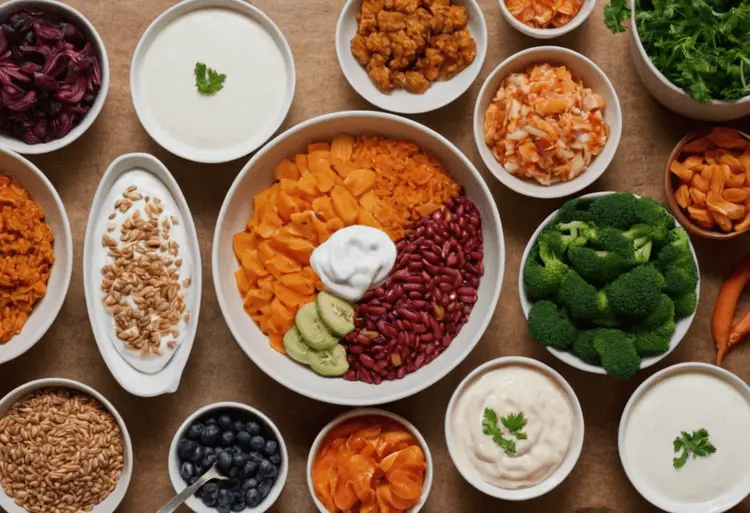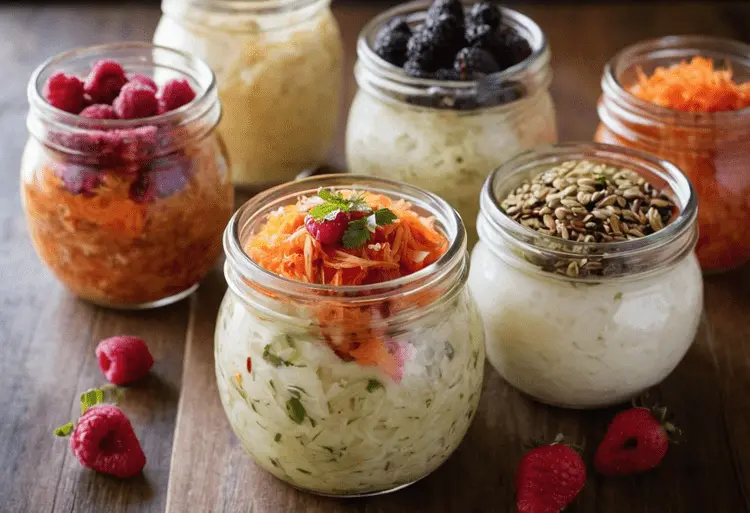Gut microbiome feeling out of whack? Maybe you’re experiencing nagging digestive issues, unexpected weight fluctuations, or those frustrating mood dips. The root of these problems might lie deeper than you imagine – within your gut.
Your gut microbiome, that vast internal ecosystem of bacteria and other microbes, plays a far greater role in your overall health than just digestion. An out-of-sync gut microbiome can throw your immune system, metabolism, and even your mental well-being out of balance.
The amazing thing is, you have tremendous power to reshape your gut health! By understanding your gut flora and making targeted changes, you can build a thriving microbiome. Get ready to take back control of your health – let’s explore the world of probiotics for gut health and start optimizing your wellness from the inside out.
Your Gut Health Quickstart Guide
- Load up on fiber
- Add fermented foods
- Choose colorful produce
- Consider targeted probiotics
- Manage stress effectively
- Sleep soundly
Table of contents
The Basics of Your Amazing Gut

Introduction
Feeling sluggish? Skin breaking out? Is your mood unpredictable? It might surprise you that the root of these issues could lie within your gut.
So that’s right, your digestive system is home to a vast, complex community of microorganisms – your gut microbiome. This bustling ecosystem is absolutely critical to your overall health.
What is the Gut Microbiome?
Think of your gut microbiome as a hidden city within you. It’s teeming with trillions of bacteria, plus fungi, viruses, and other microbes.
While these might sound scary, most are actually beneficial! They work diligently to influence your health in ways you might not even realize.
Why Your Gut Microbiome Matters
Is your gut microbiome the key to unlocking better health? It could be! A balanced gut microbiome aids:
- Digestion: Helping you break down food and absorb nutrients.
- Immunity: Training your body to recognize and fight off harmful invaders.
- Mental Wellbeing: Even influencing mood and brain function!
Plus, scientists are uncovering even more ways your gut impacts your body – from weight control to chronic disease risk.
How Your Gut Microbiome Develops
Your gut microbiome is as unique as you are. It starts forming at birth and continues to evolve throughout your life.
Factors like how you were born (vaginal vs. C-section), what you ate as a baby, and your current lifestyle all shape the microbes living within you.
Let’s Talk About Your Gut!
Are you ready to dive deeper into the incredible world of your gut microbiome? Get social! Tag me or leave a comment below about your biggest gut health questions.
Check out this resource for understanding mind-body techniques for stress management – after all, keeping stress levels low supports a happy gut!
Let’s explore how your gut microbiome impacts your health, and most importantly, what you can do to give those hardworking microbes a helping hand. After all, a thriving internal ecosystem could be the secret to your best health yet!
Improving your gut microbiome is a journey, and probiotics are a powerful tool in your toolbox. But how do you choose the right ones? And do they really work? Let’s demystify probiotics and find the best ways to support your gut…
Gut Microbiome – Your Health Powerhouse
Gut-Brain Axis: Microbes and Your Mood
Ever felt butterflies in your stomach before a big presentation? Or had gut-wrenching anxiety that leaves you doubled over? That’s your gut-brain axis at work! Turns out, those trillions of microbes in your gut manufacture mood-altering neurotransmitters. Yep, your gut bacteria might be playing with your emotions!
- Could your gut microbiome hold the key to managing anxiety or bluesy moods?
- Is gut health a missing piece in the puzzle of mental health?
Science is digging into these questions with some fascinating results. While we’re still in the early days, it’s clear your gut and brain have a hotline.
Immunity and Your Internal Army of Microbes
Get sick at the drop of a hat? Struggle with allergies or eczema? Your gut microbiome might be missing some key recruits! Friendly bacteria act like boot camp instructors, training your immune system to recognize the good guys from the bad. A well-balanced gut means a more effective fighting force.
- Could strengthening your gut microbiome protect you from pesky infections?
- Are food sensitivities a sign that your immune system is on high alert?
Optimizing your gut health with a focus on diversity could support a robust immune response. Think of your microbes as a microscopic defense shield!
Weight, Metabolism, and Your Gut
Can those tiny critters in your gut really influence your weight? Turns out, they might! Gut bacteria play a crucial role in how your body extracts calories from food, sends hunger and fullness signals, and even how you store fat.
- Are there microbes making it harder to shed unwanted pounds?
- Is your metabolism getting a microbe-powered boost – or sabotage?
While the science on the complex gut microbiome-weight connection is evolving, one thing’s clear: the food you choose profoundly impacts your internal ecosystem.
So are you curious to learn more about how specific prebiotics fuel beneficial bacteria? You can explore prebiotic foods at the Center for Prebiotic Research: prebiotic.org.
Chronic Diseases and the Microbiome
This is where things get truly mind-blowing. Researchers are uncovering potential links between your gut microbiome and a whole range of chronic diseases – things like heart disease, certain types of cancer, and even neurological disorders.
- Could a disrupted gut pave the way for serious health conditions down the road?
- Is the future of medicine found in restoring harmony to our internal ecosystem?
While we don’t have all the answers yet, it’s incredibly exciting to think your gut microbes might hold keys to prevention and potentially even treatment of major diseases.
Gut Troubles: When Your Microbiome Is Off-Kilter
Is your gut trying to tell you something? Bloating, gas, irregularity, or just a general feeling of being “off” could all be signs your gut microbiome is out of balance. These symptoms are annoying, but did you know they might point to deeper health concerns?
Signs Your Gut Microbiome Needs Support
- Persistent digestive issues: Think chronic constipation, diarrhea, bloating that won’t quit. These interrupt your day and can be a signal your gut needs some TLC.
- Unexpected changes: Weight fluctuations, skin problems (like eczema or acne), fatigue, or even brain fog – are these out of nowhere? Surprisingly, your gut microbiome might play a role.
- The gut check: Of course, these symptoms can have other causes. However, improving your gut health is often beneficial regardless.
Factors that Harm Your Gut Microbiome
So, what throws your gut microbiome off balance? Let’s look at the usual suspects:
- Poor diet: A steady stream of processed foods, sugary treats, and not enough fiber starves your good gut bacteria.
- Overuse of antibiotics: While life-saving when necessary, antibiotics disrupt your whole microbiome. That’s why restoring gut health afterward is key.
- Chronic stress: It affects more than just your mood! Stress impacts digestion and can alter your gut’s microbial balance. Techniques for mind-body stress management can make a huge difference.
Other culprits include lack of sleep, environmental toxins, and certain medications.
Common Disorders Linked to Gut Imbalance
Is your unruly gut contributing to a specific condition? Here are a few possibilities:
- IBS (Irritable Bowel Syndrome): Marked by cramping, pain, and digestive irregularities.
- IBD (Inflammatory Bowel Disease): More serious conditions like Crohn’s disease and ulcerative colitis.
- Allergies and food sensitivities: A compromised gut may fuel these reactions.
Let’s Talk Nutrition
Remember, good nutrition is foundational for a thriving gut microbiome. A focus on whole, unprocessed foods, plenty of fiber, and gut-loving fermented foods can go a long way.
How to Build a Healthier Gut

Craving a happier belly? Maybe you want clearer skin, better sleep, or a stronger immune system. Believe it or not, good gut health plays a role in all that…and more! So, how do you actually make your gut microbiome work for you?
Prebiotics and Probiotics: What’s the Difference?
Think of your gut like a garden. Prebiotics are the fertilizer, feeding those good bacteria already there. Probiotics are like introducing new helpful plant varieties to the mix. Is one more important than the other? Nope! Both are key for a thriving gut microbiome.
Foods to Love Your Gut
- Fermented Friends: Think beyond just yogurt! Kimchi, sauerkraut, kefir, and miso deliver a dose of beneficial bacteria. Try incorporating a small serving into your daily meals.
- The Fiber Fantastic: Aim for a variety of fruits, vegetables, whole grains, and legumes. Think bright colors and lots of textures! Struggling to hit your fiber goals? Learn more about prebiotics – they can give you a powerful boost.
- Polyphenols Power-Up: These plant compounds act like fuel for your good gut bacteria. Snack on berries, sip some tea, enjoy a bit of dark chocolate…it’s delicious gut support!
Best Types of Probiotic Supplements
Not all probiotics are created equal! Look for products listing specific strains (like Lactobacillus or Bifidobacterium), a high CFU count (those are the colony-forming units, a.k.a the number of live bacteria), and brands with a good reputation.
Unsure where to start? Talk to a healthcare provider who specializes in gut health for personalized recommendations.
Lifestyle Changes for Optimal Gut Health
- Stress Less: Easier said than done, right? But chronic stress throws your gut microbiome out of whack. Explore mind-body techniques for stress management – and see how your belly feels the difference.
- Sleep Tight: Your gut needs rest too! Aim for consistent sleep patterns for the best microbiome balance.
- Get Moving: Even moderate exercise supports healthy gut bacteria. Find activities you enjoy and make them part of your routine.
- Mind Your Meds: Antibiotics are lifesavers, but they disrupt your gut. Talk to your doctor about minimizing their use when possible.
Let me know – what are your favorite gut-friendly foods? Any tips that have worked for you? Share in the comments below! #GutHealth #Microbiome
The Future of Gut Microbiome Science
Imagine a world where your gut microbiome is your personal health assistant. A world where probiotics aren’t just generic, but tailored to your exact microbial makeup. Sounds like science fiction, right?
But the rapid advancements in gut microbiome research are bringing us closer than ever.
Personalized Probiotics and Beyond
What if, instead of a general probiotic, you had a custom blend? Designed specifically to patch up the gaps in your unique gut microbiome? That’s the tantalizing possibility on the horizon.
Tailored interventions hold immense promise for improved health outcomes. Could this mean finally getting those digestive issues under control or having a real impact on your mood? The research is definitely pointing that way!
Furthermore, scientists are hard at work figuring out how to use those trillions of microbes for more than just prevention. Could custom bacteria fight diseases within our gut?
Might your microbiome hold the key to managing autoimmune conditions? While still in early stages, the possibilities are mind-boggling.
Fecal Microbiota Transplants (FMT): A Controversial Frontier
Right now, FMT is mainly used to treat life-threatening, recurrent C. difficile infections (and wow, is it effective!). But the implications go far beyond. Could transplanting healthy donor microbes help reset an imbalanced gut in other conditions?
Research is underway to explore applications for everything from IBS to metabolic diseases. However, there are still risks and unknowns to consider.
Gut Microbiome – Where Nutrition Meets Medicine

The food you eat has a more profound impact on your microbes than you might think! Researchers are constantly uncovering how different nutrients, dietary patterns, and even specific foods interact with your gut microbiome.
Are there particular foods you should eat – or avoid – based on your unique microbial profile? It’s not an impossible future!
Let’s Chat
This barely scratches the surface of what’s coming. The gut microbiome space is exploding with research and innovation. What possibilities excite you the most? Are you feeling hopeful, or maybe a little skeptical? Share your thoughts in the comments, or tag me on social media!
Think fermented foods are weird? My Ultimate Guide to Gut Health Recipes will change your mind! Discover surprisingly delicious ways to boost your gut health and unlock a new level of wellness.
FAQs About the Gut Microbiome: Your Questions Answered
It’s the vast community of bacteria, fungi, and other microbes living inside your digestive system. Think of it as your internal ecosystem!
Focus on fiber-rich whole foods, fermented treats like yogurt or kimchi, and colorful fruits and veggies.
Persistent digestive issues (bloating, gas, irregularity), skin problems, fatigue, or unexpected mood changes could be signs of an imbalance.
Your gut microbiome plays a role in metabolism, but it’s not the only factor. A healthy gut can definitely support your weight loss goals, though!
Absolutely! Focus on fiber-rich foods, fermented options, and polyphenol-packed choices. Learn more about the power of prebiotics on the Center for Prebiotic Research website.
Probiotics can be helpful, especially if you have gut issues or have recently taken antibiotics. But a healthy diet rich in fermented foods might be all you need.
Surprisingly, yes! Your gut and brain are in constant communication. Supporting your gut health, along with stress management techniques could help boost your mood.
Yes, at-home tests are available. However, for the most useful interpretation, consider working with a healthcare practitioner who specializes in gut health.